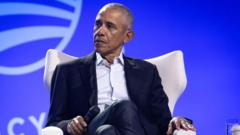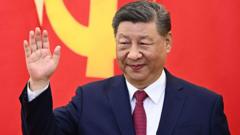China's recent move to pause rare earth mineral exports raises questions about the future of global supply chains amid ongoing trade conflicts.
China Halts Rare Earth Exports Amid Escalating Trade Tensions

China Halts Rare Earth Exports Amid Escalating Trade Tensions
Tensions rise as China suspends crucial exports in response to U.S. tariffs.
China has implemented a dramatic pause on the export of certain rare earth minerals and advanced magnets, a response to increased tariffs imposed by the Trump administration. This suspension affects key industries worldwide, including automotive, semiconductor, and aerospace sectors, which rely heavily on these materials. The export of these minerals will now require special licenses, although the infrastructure to issue such permits is still under development, leading many industry insiders to fear potential shortages.
In this increasingly heated trade war, the U.S. is grappling with the repercussions of its tariffs on Chinese imports, with no resolution in sight. The Biden administration has been eager for communication from Chinese President Xi Jinping, but Beijing remains cautious, sensing unpredictability in the relationship with the U.S. president.
As part of his recent diplomatic tour, Xi is visiting Vietnam and other Southeast Asian nations, where he's expected to finalize around 40 agreements, including a significant railway project linked to a $8.3 billion loan from China to Vietnam. This trip might reflect China's broader strategic objectives amidst rising international trade frictions.
Moreover, the U.S. has hinted at imposing new tariffs on computer chips, further complicating the trading landscape just days after temporarily exempting some electronics from such tariffs. Meanwhile, American consumers are preparing for potential price hikes as retailers contemplate whether to absorb the increased costs or pass them onto customers.
The uncertainty stemming from the trade war is palpable, especially for Taiwan's small exporters, who have echoed sentiments of concern about the future. As geopolitical dynamics evolve, businesses worldwide are left in a precarious position, trying to navigate an increasingly complex market landscape.
In this increasingly heated trade war, the U.S. is grappling with the repercussions of its tariffs on Chinese imports, with no resolution in sight. The Biden administration has been eager for communication from Chinese President Xi Jinping, but Beijing remains cautious, sensing unpredictability in the relationship with the U.S. president.
As part of his recent diplomatic tour, Xi is visiting Vietnam and other Southeast Asian nations, where he's expected to finalize around 40 agreements, including a significant railway project linked to a $8.3 billion loan from China to Vietnam. This trip might reflect China's broader strategic objectives amidst rising international trade frictions.
Moreover, the U.S. has hinted at imposing new tariffs on computer chips, further complicating the trading landscape just days after temporarily exempting some electronics from such tariffs. Meanwhile, American consumers are preparing for potential price hikes as retailers contemplate whether to absorb the increased costs or pass them onto customers.
The uncertainty stemming from the trade war is palpable, especially for Taiwan's small exporters, who have echoed sentiments of concern about the future. As geopolitical dynamics evolve, businesses worldwide are left in a precarious position, trying to navigate an increasingly complex market landscape.






















